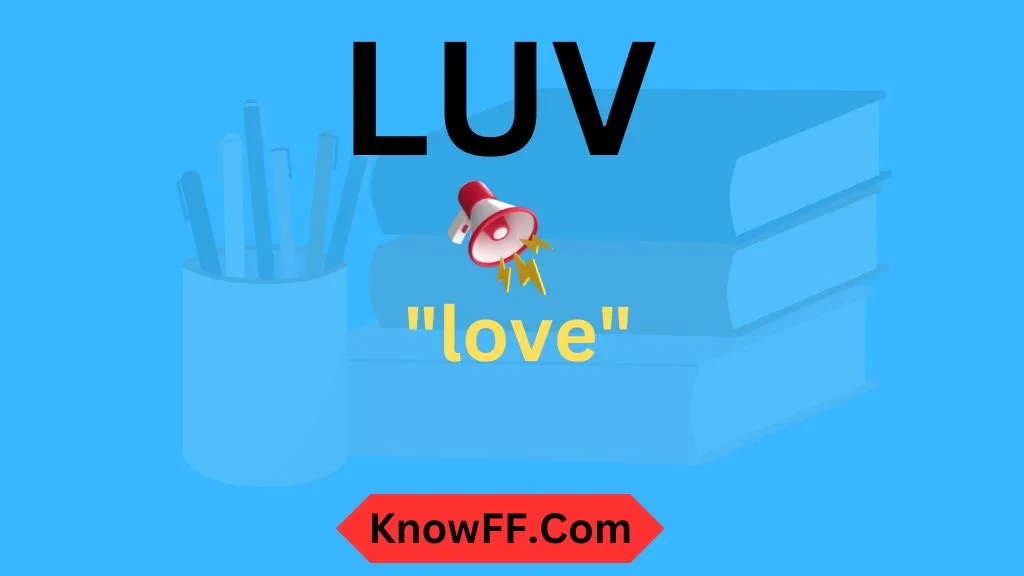The word “luv” is widely used in text messages, social media, and online conversations. It is a common variation of “love,” often used in a casual or affectionate way.
People frequently search for the meaning of luv in text to understand its significance, its different contexts, and how to use or respond to it appropriately.
Luv has evolved as part of digital communication, where abbreviations and slang terms are often used to express emotions quickly.
It is commonly found in WhatsApp, Instagram, TikTok, and other messaging platforms. While most people associate luv with affection or fondness, its meaning can vary based on the conversation and platform.
This article explores the different interpretations of luv, its background, usage, misconceptions, and relevance in both personal and professional communication.
Meaning & Definition
The term luv is an informal spelling of the word “love.” It is often used in casual or playful contexts to express affection without the depth or seriousness of the traditional term. Here are some key interpretations:
- Casual Affection: Used between friends, family, or partners to express warmth and fondness.
- Slang for Love: A simplified spelling commonly seen in text messages and online chats.
- Regional Use: In some dialects, “luv” is a common spoken term for addressing someone affectionately, such as “Alright, luv?”
Although luv is widely recognized, it is essential to understand the context in which it appears, as its meaning may change based on tone and situation.
Background
The term “luv” has its origins in phonetic spelling and informal speech. It became popular with the rise of text messaging and online chat platforms, where users preferred short and simple words to communicate quickly. The use of luv has been reinforced by social media trends, memes, and pop culture references.
Historically, the word “love” has been written in various forms, and “luv” is just one of many informal spellings used in different English dialects. In British English, particularly in working-class communities, luv has been a common term of endearment for decades. For example, a shopkeeper might say, “Here you go, luv,” when handing change to a customer.
In digital culture, luv is often seen in casual interactions where users want to express affection in a non-serious or playful manner. It is frequently used in social media comments, direct messages, and memes.
Usage in Different Contexts
Casual Conversations & Social Media
- Text Messages: People use luv to sign off messages affectionately, e.g., “Good night, luv!”
- Instagram & TikTok Comments: Used to compliment or support someone, e.g., “You’re amazing, luv!”
- Twitter & Reddit: Often used in fan communities or to express playful admiration.
Professional Fields (Medical, Physics, Aviation, and Business)
- Medical & Physics Terminology: LUV does not have a standardized meaning in medical or physics fields.
- Aviation & Business: While some acronyms in business and aviation resemble LUV, the term is not widely recognized in professional settings.
Meaning in Chat, WhatsApp, Instagram, TikTok
Luv is frequently used across different platforms, each with its unique context:
- WhatsApp: Often used in personal chats as a term of endearment, e.g., “Miss you, luv.”
- Instagram: Common in comments and captions, showing appreciation, e.g., “Looking gorgeous, luv!”
- TikTok: Used in trends and challenges, often in hashtags, e.g., #LuvU.
- Snapchat: Appears in streak messages or affectionate snaps, e.g., “Luv u bestie!”
Meaning in Physics, Medical, and Aircraft Terminology
While luv is primarily an informal term for “love,” there are rare cases where similar abbreviations appear in technical fields:
- Physics: No widely accepted meaning for luv in physics.
- Medical: LUV is not a common medical acronym, though some hospitals or clinics may use it informally.
- Aircraft Terminology: LUV is the ticker symbol for Southwest Airlines on the New York Stock Exchange (NYSE).
For professional contexts, it’s always best to check the specific meaning based on the industry.
Common Misconceptions
- Luv vs. Love: Many assume luv and love are interchangeable, but luv is more casual and less intense.
- Luv in Formal Writing: Some mistakenly believe luv can be used in professional writing, but it is strictly informal.
- Luv as a Slang Term for Something Else: Some people misinterpret luv as a different slang term, but it is simply a phonetic spelling of “love.”
Similar Terms & Alternatives
If someone uses luv, they may also use other affectionate or playful terms, including:
- Love (traditional spelling, more serious)
- Lov (shortened variant, rarely used)
- Babe (affectionate nickname, commonly used in relationships)
- Hun (short for “honey,” another term of endearment)
- Bae (popular slang for a significant other)
While these words convey similar feelings, each has its unique connotation.
How to Respond to “Luv” in a Message
Your response to luv depends on context and relationship with the sender:
- Friendly Context: Reply with “Thanks, luv!” or “Aww, luv u too!”
- Romantic Context: If a partner sends “luv u,” respond with “Love you too!”
- Confusing Context: If unsure, ask, “What do you mean by luv?”
Differences from Similar Words
Here’s how luv compares to similar words:
| Word | Meaning | Usage |
| Love | Deep affection | Formal & serious |
| Luv | Casual affection | Informal & playful |
| Bae | Term for partner | Slang |
| Hun | Short for honey | Friendly or romantic |
Luv is generally lighter and less formal than “love,” making it suitable for friendly interactions.
Relevance in Online Conversations & Dating Apps
Luv is widely used in digital communication, especially in dating apps like Tinder, Bumble, and Hinge. Some common ways it appears include:
- “Hey luv, how’s your day?” – Used as a flirty greeting.
- “Miss u, luv!” – Expressing fondness in an online relationship.
- “Looking great, luv!” – A casual compliment on a dating profile.
Since dating apps encourage informal conversations, luv is commonly seen in messages and bios.
FAQs
1. What does luv mean in text?
Luv is an informal way to say “love,” often used in friendly or affectionate messages.
2. Is luv the same as love?
No, luv is a casual, playful version of love, while love carries more emotional weight.
3. Can I use luv in professional emails?
No, luv is strictly informal and should not be used in formal or business communication.
4. What does luv mean on WhatsApp?
On WhatsApp, luv is used as an affectionate term in casual conversations.
5. How do I respond to “luv” in a text?
Your response depends on context—if friendly, reply positively; if romantic, match the tone.
6. What does luv mean in British slang?
In the UK, luv is a common term of endearment used in informal speech.
7. Does luv have a meaning in science?
No, luv is not commonly used in scientific fields like physics or medicine.
Conclusion
Luv is a widely used slang term that expresses casual affection in text messages and online conversations. While it is a variation of “love,” it is less formal and carries a lighter tone.
Whether used in WhatsApp, Instagram, or dating apps, luv remains a popular way to show appreciation and fondness.
Understanding its context ensures that you use and respond to it appropriately in different interactions.











